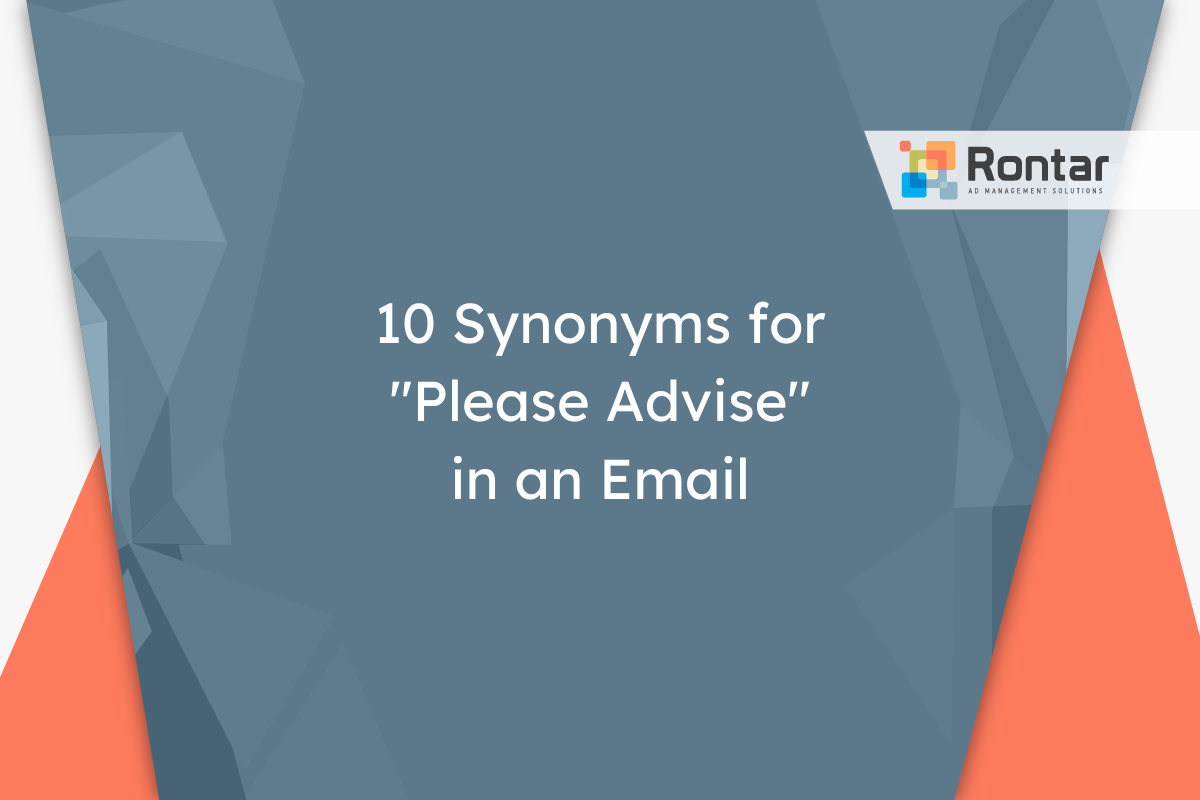10 Synonyms for “Please Advise” in an Email

In a professional email, asking for advice is common, but using the same phrase over and over can get boring. This article offers ten different ways to say “please advise” to add variety to your messages. Each alternative is explained to help you understand when and why it might be a better option.
By exploring these options, you can communicate more effectively and respectfully in your emails.
Is It Professional to Say “Please Advise”?
When you’re wondering if it’s professional to say “please advise” in an email, the answer is yes. This phrase is not only formal but also considered polite. It’s a great way to ask for guidance, clarification, or an opinion on a matter. However, it’s essential to use it in the right contexts.
“Please advise” works best in professional settings where you’re seeking advice or specific instructions. It’s ideal for emails where you’ve explained a situation and need the recipient’s expertise or decision to proceed. This phrase is particularly useful in business communications, between colleagues, or when you’re contacting a service provider.
Here’s an example of how to use “please advise” in an email:
Dear Max, I've attached the final draft of the report we discussed last week. I've incorporated all the data from the recent surveys as you suggested. Could you review the findings section and please advise on any changes you think are necessary? Looking forward to your feedback. Best regards, Alex
Let’s look at the pros and cons of using “please advise.”:
Pros:
- Clear request for advice or direction
- Conveys respect and professionalism
- Suitable for a wide range of professional scenarios
Cons:
- Can be perceived as vague without enough context
- Some find it overly formal or outdated
- May not be the best choice in very casual work environments
Sometimes, people might seek an alternative phrase to “please advise.” This could be due to a desire to sound less formal or to avoid repetition in communications. Seeking synonyms or alternatives allows for more nuanced or friendly tones, depending on the relationship between the sender and the recipient. Using different phrases can also help clarify the specific kind of assistance or response you’re looking for, making your request clearer. While “please advise” is a perfectly acceptable choice, knowing when and why to seek alternatives can enhance your email communication skills.
10 Other Ways to Say “Please Advise” in an Email
Looking for a different way to ask for advice in your emails? Here are ten great alternatives.
- Your guidance would be appreciated
- Could you provide your input?
- I would value your opinion
- What are your thoughts?
- Your feedback would be helpful
- Can you shed some light on this?
- I’m eager to hear your viewpoint
- Could I ask for your advice?
- Please share your insights
- How would you suggest we proceed?
1. Your guidance would be appreciated
This phrase is very polite and somewhat formal, making it a great synonym for “please advise.” It specifically asks for guidance, which implies that you’re looking for someone to lead you through a decision or issue. It conveys respect and the importance of the recipient’s opinion or decision in the matter.
When you want to emphasize the value of the recipient’s expertise without sounding too demanding, this alternative is better suited. It’s perfect for situations where you’re not sure about the next steps and genuinely need direction.
Here’s an example usage in an email:
Dear Lisa, After reviewing the budget for the next quarter, there are a couple of areas that aren't clear to me. Your guidance would be appreciated on how to allocate resources for the marketing project. Warm regards, Tom
2. Could you provide your input?
This alternative is informal yet remains professional and polite. It directly asks for the recipient’s ideas or thoughts on a matter. Unlike the more formal “please advise,” this phrase encourages a more collaborative approach. It’s great for a workplace that values open communication and teamwork.
When you’re seeking a colleague’s perspective in a more collaborative and less authoritative manner, this phrase shines. It fits well within teams that regularly share feedback and ideas.
Here’s a sample message using this alternative:
Hi Mark, We're updating the client proposal, and I spotted a few areas that might need your expertise. Could you provide your input on the technical descriptions? Cheers, Elena
3. I would value your opinion
This phrase conveys a high level of respect and politeness, making it a suitable formal and professional alternative to “please advise.” It puts the recipient’s opinion in high regard, indicating that their feedback is crucial and valued.
It’s particularly effective when you’re engaging with someone whose opinion you greatly respect or when the topic requires a deep level of thought and consideration. This alternative signals that you’re not just looking for any advice, but specifically value the recipient’s expertise.
For this alternative, we recommend the following example:
Dear Dr. Simmons, In preparation for the upcoming symposium, we're considering several themes that could potentially shape our discussions. I would value your opinion on which theme might have the most impact. Best wishes, Nina
4. What are your thoughts?
This is a less formal, yet professional way to ask for someone’s opinion. It’s very straightforward and encourages an open dialogue. This alternative is quite versatile, fitting a variety of contexts, from emails between close colleagues to messages seeking brainstorming ideas.
When quick feedback is needed without much preamble, or when you’re inviting an open-ended discussion, this is the ideal choice. It’s perfect for brainstorming sessions or when you want a range of perspectives.
See the sample message below:
Hi Karen, I’ve put together the initial plan for the product launch. What are your thoughts? Any area you think we should push or alter? Thanks, Omar
5. Your feedback would be helpful
This alternative is polite and leans towards being formal. It’s a respectful way to ask for someone’s thoughts or corrections. This phrase clearly states that you’re looking for feedback, but it doesn’t put pressure on the recipient to provide guidance.
Use this alternative when you’re more interested in receiving constructive feedback rather than direct advice. It’s suitable for instances where you’ve completed a task and need another set of eyes to review your work.
Here’s an example of use in an email:
Dear Sam, I've completed the draft of the partnership agreement based on our last meeting. Your feedback would be helpful to ensure all terms meet our objectives. Sincerely, Diane
6. Can you shed some light on this?
This is a more informal but still professional method to ask for clarification or information. It suggests that you’re in the dark about a topic and are looking to the recipient to illuminate it. It’s polite but conveys a desire for specific insights rather than general advice.
This alternative is particularly useful when you’re confused or missing information about a subject. It’s great for moments when you don’t just want advice but need detailed explanations or clarifications on complex topics.
Consider the following sample message:
Hello Janet, I'm trying to make sense of the new client feedback analytics tool. Can you shed some light on this? Especially on how to interpret the sentiment analysis feature. Thanks, Greg
7. I’m eager to hear your viewpoint
This phrase is polite and fairly formal, emphasizing your enthusiasm for the recipient’s perspective. It shows a strong interest in their insights and makes it clear that their opinion is valued. This alternative is excellent for engaging someone in a discussion or decision-making process.
When you are genuinely interested in acquiring a fresh perspective or enriching your understanding of a topic, this is a go-to phrase. It works well when soliciting opinions from experts or stakeholders.
Here is an example email using this alternative:
Dear Professor Thompson, As we strategize on improving our curriculum integration, I’m eager to hear your viewpoint on the proposed changes and how they align with industry needs. Kind regards, Alice
8. Could I ask for your advice?
This question is polite and leans on the informal side while still maintaining a professional tone. It’s a direct way to solicit advice, making it a good choice when you want to be clear about your request. It conveys humility and a willingness to learn.
When you’re looking for advice in a more personal tone or addressing someone you have a close professional relationship with, this phrase is better suited. It’s ideal for situations where you’re open to detailed guidance or mentorship.
For this alternative, see the sample email below:
Hi Jordan, I've been brainstorming on our social media strategy for next quarter. Could I ask for your advice on which platforms we should focus on to maximize engagement? Best, Hailey
This is a professional and polite way to request someone’s expertise or perspective. It’s a bit more formal than some of the other alternatives, signaling your respect for the recipient’s knowledge or experience. This phrase is great for when you need deep, thought-out responses.
This alternative is especially suitable when you’re seeking detailed analysis or opinions from someone with special knowledge or experience in a particular area. It’s useful in formal reports, strategic planning, or research-driven projects.
Here is an example message:
Dear Dr. Hopkins, Given your extensive research on renewable energy, please share your insights on the most viable options for rural communities. Respectfully, Erin
10. How would you suggest we proceed?
This alternative is very professional and formal. It directly asks for guidance on the next steps, implying a strong respect for the recipient’s judgment and decision-making ability. It’s polite and places the action squarely in the hands of the recipient, making it clear that their advice will drive subsequent actions.
When you’re at a decision-making crossroads and require clear direction on how to move forward, this phrase is beneficial. It’s particularly effective in situations where strategic decisions need to be made, and the path is not clear.
And here’s how you might use it in an email:
Dear Monica, We've encountered some challenges with the current project timeline due to unexpected technical issues. How would you suggest we proceed? Your expertise would greatly assist in navigating these setbacks. Thank you, Derek
Final Thoughts
Choosing the right way to ask for advice in emails shows respect and professionalism. The alternatives provided here help you match your message’s tone to the relationship you have with the recipient and the context of your request. Whether you need a formal suggestion, personal input, or quick feedback, there’s an option for every situation.
Remember, how you ask can be just as important as what you ask for. Switching up your language keeps your emails fresh and engaging. Ultimately, the goal is clear communication and creating a positive impression.






